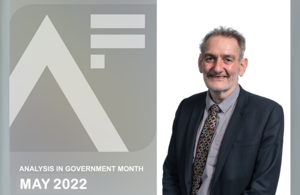Mr Speaker, with permission, I’d like to make a statement on the Ockenden Report.
This independent review was set up in 2017 in response to concerns from bereaved families about maternity at Shrewsbury and Telford Hospital NHS Trust.
Its original scope was to cover the cases of 23 families but since it began, sadly, many more families have reported concerns.
Due to this tragically high number of cases and the importance of this work to patient safety early conclusions were published in an initial report in December 2020. We accepted all of the recommendations from this first report and the NHS is now taking them forward.
Today, the second and final Report has been published.
This is one of the largest inquiries relating to a single service in the history of the NHS looking at experiences of almost 1,500 families, from 2000 to 2019. I’d like to update the House on the findings of this report, and then turn to the actions that we are taking as a result.
This report paints a tragic and harrowing picture of repeated failures in care over two decades which led to unimaginable trauma for so many people.
Rather than moments of joy and happiness for these families their experience of maternity care was one of tragedy and distress and the effects of these failures were felt across families, communities and generations. The cases in this report are stark and deeply upsetting. Of twelve cases where a mother had died the report concludes that in three quarters of those cases the care could have been “significantly improved”.
It also examined 44 cases of HIE a brain injury caused by oxygen deprivation. Two thirds of these cases featured “significant and major concerns” in the care provided to the mother. And the report says from almost 500 cases of stillbirth, one in four were found to have major concerns in maternity care which if managed appropriately “might or would” have resulted in a different outcome.
When I met with Donna Ockenden last week she told me about basic oversights at every level of patient care. Including one case where important clinical information was kept on Post-it notes which were then swept into the bin by cleaners with tragic consequences for a newborn baby and her family. In addition, there were repeated cases where the Trust failed to undertake serious incident investigations and where investigations did take place, they didn’t follow the standards that would have been expected.
These persistent failings continued as late as 2019 and multiple opportunities to address them were ignored including by the Trust Board who were accountable for these services.
Reviews from external bodies failed to identify the substandard care that was taking place and some of the findings gave false reassurances about maternity services at the Trust.
The CQC only rated maternity services inadequate for safety in 2018 which is unacceptable given the huge deficiencies in care that are outlined in this Report.
The Report also highlights serious issues with the culture within the Trust. For instance, two thirds of staff were surveyed and reported that they had witnessed cases of bullying and some staff members withdrew their co-operation with the Report within weeks of publication The first report already concluded – and I quote –that “there was a culture within the Trust to keep Caesarean rates low because they were perceived as the essence of good maternity care”. And today’s report adds that – and I quote again –“many women thought any deviation from normality meant a Caesarean section was needed and this was then denied to them by the Trust”.
Mr Speaker, it is right that both the Royal College of Obstetricians and Gynaecologists and the Royal College of Midwives have said recently that they regret their campaign for so-called normal births. It’s vital that across maternity services that we focus on safe, personalised care where the voice of the mother is heard throughout.
The Report shows a systemic failure to listen to families affected many of whom who had been doggedly persistent in raising issues over several years. One mother said that she felt like a “lone voice in the wind”. Bereaved families told the Report that they were treated in a way that lacked sensitivity and empathy and appallingly, in some cases the Trust blamed these mothers for the trauma that they had been through. In the words of Donna Ockenden, the Trust “failed to investigate, failed to learn and failed to improve”.
We entrust the NHS with our care, often when we are at our most vulnerable. In return we expect the highest standards I have seen with my own family the brilliant care that NHS maternity services can offer. But when those standards are not met we must act firmly and the failures of care and compassion that are set out in this Report have absolutely no place in the NHS.
To all the families that have suffered so greatly: I am sorry.
The Report clearly shows that you were failed by a service that was there to help you and your loved ones to bring life into this world. We will make the changes that the Report says are needed, at both a local and national level.
Mr Speaker, I know that Honourable Members and those families who have suffered would want reassurances that the individuals who are responsible for these serious and repeated failures will be held to account.
I’m sure that the House will understand that it is not appropriate for me to name individuals at this stage. However, I’d like to reassure Honourable Members that a number of people who were working at the Trust at the time of the incidents have been suspended or struck off from the professional register and members of senior management have also been removed from their posts. There is also an active police investigation – Operation Lincoln – which is looking at around 600 cases. Given that this is a live investigation .I am sure that Honourable Members will recognise that I’m not able to comment further on that.
Today’s report acknowledges that since the initial report was published in 2020, we have taken important steps to improve maternity care. This includes £95 million of maternity services across England to boost the maternity workforce, to fund programmes for training, development and leadership. The second Report makes a series of further recommendations. It contains 66 for the local Trust 15 for the wider NHS and 3 for me as Secretary of State.
The local Trust, NHS England, and the Department of Health and Social Care will be accepting all 84 recommendations. Earlier today, I spoke to the Chief Executive of the Trust, who was not in post during the period examined in the report. I made it clear how seriously I take this Report and the failures that were uncovered and I reinforced that the recommendations must be acted on promptly. But as the Report identifies, there are wider lessons that must also be learnt and it contains a series of actions that should be considered by all Trusts that provide maternity services. I have asked NHS England to write to all of these Trusts, instructing them to assess themselves against these actions and NHS England will be setting out a renewed delivery plan that reflects these recommendations.
I am also taking forward the specific recommendations that Donna Ockenden has asked me to put in place. The first is the need to further expand the maternity workforce. Just a few days ago, the NHS announced a £127 million funding boost for maternity services across England. This will bolster the maternity workforce even further and it will also fund programmes to strengthen leadership, retention and capital for neonatal maternity care.
Second, we will take forward the recommendation to create a working group independent of the Maternity Transformation Programme with joint leadership from the Royal College of Midwives and the Royal College of Obstetricians and Gynaecologists.
Finally, Donna Ockenden said that she endorses the proposals that I announced in January to create a Special Health Authority to continue the Maternity Investigation Programme that is currently run by the Healthcare Safety Investigation Branch. Again, we will take her proposals forward and the SHA will start its work from April next year.
I would like to thank Donna Ockenden and her whole team for the forensic and compassionate approach that she has taken throughout this distressing inquiry. This report has given a voice at last to those families who were ignored and so grievously wronged and it provides a valuable blueprint for safety and safe maternity care in this country for years to come.
Finally, Mr Speaker, I would like to pay tribute to the families whose tireless advocacy was instrumental to this Review being set up in the first place. I cannot imagine how difficult it must have been for them to come forward and tell their stories and this Report is testament to the courage and the fortitude that they have shown in the most harrowing of circumstances.
This Report is a devastating account of bedrooms that are empty families that are bereft and loved ones taken before their time. We will act swiftly so that no families have to go through the same pain in the future.
I commend this statement to the House.

